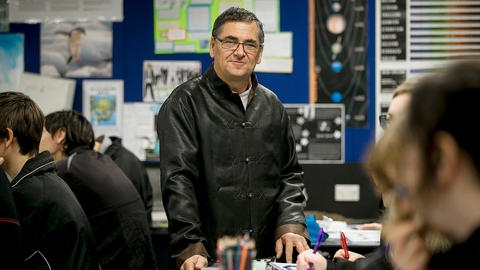Oceanía/Nueva Zelanda/02 de Julio de 2016/Autora:Susan Strongma/Fuente:NZHerald
RESUMEN: Los directores de dos de las mejores escuelas secundarias de Auckland han acusado a los funcionarios de educación de no hacer nada para hacer frente a una «crisis» por la escasez de profesores de matemáticas y física. Y los expertos dicen que el Ministerio de Educación tiene que actuar ahora para detener el problema que afecta a la futura fuerza laboral del país. Russell Brooke, Director del Colegio Long Bay dijo, que la escasez se muestran en la electrónica, contabilidad y economía. Por su parte el director David Hodge del Colegio Rangitoto dice que este año la escuela ha gastado $ 11.000 en reclutamiento de profesores desde el exterior a través de una agencia. La escuela contrató a un maestro de la electrónica de Canadá porque nadie había respondido a una oferta de empleo anunciados en Nueva Zelanda durante un mes. «Estoy muy a gusto diciendo que hay una crisis en torno a la enseñanza», dijo el señor Brooke.
Principals at two of Auckland’s top high schools have accused education officials of doing nothing to address a «crisis» over a shortage of maths and physics teachers.
And experts say the Ministry of Education needs to act now to stop the problem impacting on the country’s future workforce.
Long Bay College principal Russell Brooke said shortages were showing in electronics, accounting and economics.
Rangitoto College principal David Hodge says this year the school has spent $11,000 recruiting teachers from overseas through an agency. The school hired an electronics teacher from Canada because no one had responded to a job vacancy advertised in New Zealand for a month.
«I’m quite comfortable saying there is a crisis around teaching,» Mr Brooke said.
He said the ministry had been aware of the problem for at least two years.
The ministry did not respond to questions on the issue, though minister Hekia Parata admitted more maths, science and technology graduates needed to be drawn into the teaching profession.
«The Education Ministry is working with principals on both short and long-term solutions.»
She said the ministry was working with Immigration NZ, NZQA and the Education Council to make it easier to employ overseas teachers.
«It’s disappointing that a handful of principals with whom the ministry has been engaged in a thorough process around these issues and who understand both the challenges and the initiatives under way are speaking as if no action has been taken.»
Mr Brooke said the shortage was a major stress on schools, but in many cases principals were afraid to speak out about it, for fear of putting off prospective students.
He was aware of five schools in the North Shore area which had recently lost staff – many whom had moved where they could get the same salary but live for less.
Among jobs currently advertised more than 20 are for maths teachers, with another 20-plus schools advertising for science teachers. And in a Post Primary Teachers’ Association survey of 206 principals from March, maths, chemistry, physics, science, Te Reo Maori and technology were mentioned most frequently as problem areas for recruitment.
Shaun Sutton, chief executive of Teach First NZ – a teacher training organisation that aims to tackle inequality, said a vicious cycle had developed – where schools were unable to find quality teachers in maths and physics, which was leading to fewer children going on to study those subjects at university, therefore meaning fewer graduates in those areas.
Mr Sutton said several factors contributed to the shortage of teachers – a perceived low status of the profession, a perceived lack of career opportunities in the classroom, and pay – which for a first-year secondary school teacher is $48,316 per year.
There was also a lot of competition for graduates with maths and science qualifications, from corporate employers, the public service and overseas employers.
AUT’s faculty of education head, Lyn Lewis, said of those studying teaching this year through the university, none were training to specialise in physics.
Ms Lewis said the shortage of students studying to teach science, technology, engineering and maths (stem) subjects – which have been identified as the biggest growth areas worldwide – had been ongoing for «a number of years».
Secondary Principals Association president Sandy Pasley said the shortage was a concern, but after talks with the ministry she felt positive that change would be made soon to combat the issue head on.
Fuente: http://m.nzherald.co.nz/nz/news/article.cfm?c_id=1&objectid=11667357





 Users Today : 43
Users Today : 43 Total Users : 35459949
Total Users : 35459949 Views Today : 49
Views Today : 49 Total views : 3418514
Total views : 3418514